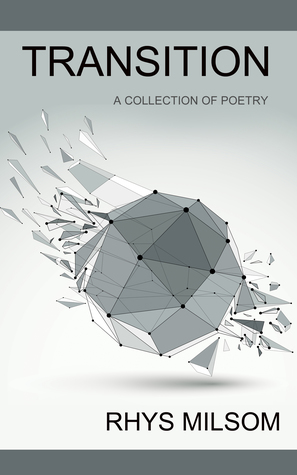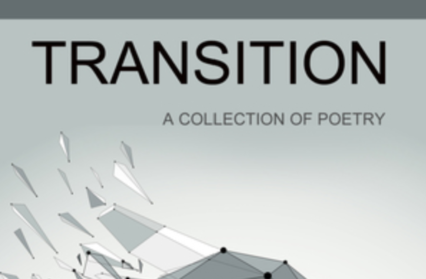Rosalind Hudis reviews Transition by Rhys Milsom, his second poetry collection and a reflective, poignant commentary on modern life.

Transition (Accent Press, 2016) is Rhys Milsom’s second collection, and like his first, Amnesia (Accent Press, 2015) evokes, in several of the poems, memories of his childhood and youth in the Rhondda Valley. Amnesia gave a stark account of that background. Milsom explores the difficult twists of his journey to move beyond it, whilst acknowledging the degree to which it has shaped, and still shapes his identity. That ambivalence is still present in Transition. But there has truly been a transition in the sense that the poet-narrator seems to be standing at a more reflective distance: he never mutes the facts with nostalgia, but there is a new note of establishing some kind of anchorage in the past. ‘Reflectiveness’ becomes a tool for raising a sanctuary in the heart of memories.
This sense is strongly present in ‘Generations’. The poem recalls Milsom’s great-grandparents and grandparents through tender observations that seem to fold the generations into each other and the spaces they inhabit. These are not details of an easy life. They witness to the hardship endured by people living and working in mining communities. But the poet holds a memory that seems to fold him, in turn, into a warmth at the heart of the travail. Writing of his great grandmother he reveals how.
the beige walls and carpets
mirror
her skin but not her:
calm
warm
tired
I was asleep
as my father drove me there
every time
waking up on her lap
…..
Milsom’s poems often celebrate the anchoring and the nourishment provided by love – poignantly so, as a new father. This is captured in images of ‘bleeding into’ or saturation – itself a form of transition. In an adroit shift of metaphor, his baby daughter seems to express her feelings of security by kicking the bathwater playfully into the carpet. It becomes an image of reciprocal caring and domestic nurture, echoed in the acoustic effects:
she kicks all the water
out of the bath
suds soothe into the carpet
like stock in broth
At the other extreme, saturation in Transition can be about vulnerability: to painful memory, to the arbitrary and violent forces of nature, to climate-change, to the dislocations wrought by time and distance, by contemporary culture, or by medication. Wind is a major image in the collection, emblematic of all that threatens security and diminishes the human scale, by silencing voices and infiltrating the shelters of love and custom – and avoidance – we build around ourselves. This is searingly expressed in ‘The West Coast of Wales’ where the poet recounts witnessing a small child nearly swept out to sea. Milsom’s poetic skill is evident in the way he sets the scene with precise but multi-performing detail:
There’s small boy
playing amongst the fragmented landscape
his parents watch, drinking
wine and eating from
a battered picnic basket.
They shout and laugh at him,
his replies stolen and rushed
away by the wind
………………
Milsom’s narratives are always immediate and tangible, linked by recurring motifs, and rendered, at their best, in unfussy, accessible language: we walk straight into the worlds he creates. However, they often unfold onto profounder enquiries that find ways to let layers of interpretation co-exist. In the disarmingly titled ‘Dislodging the thoughts is as easy/ as riding a bike’ his cumulative use of list form simultaneously energises and disables the traumatic experience of – one presumes – drug overdose. It is both like a charm for protection and a post-traumatic replaying:
The ethereal blackout wasn’t real
the pills weren’t real
the midnight park-gates weren’t real
her fingers down my throat weren’t real
The effect is to let the reader into every moment of pain of the speaker-as-character in his own drama, whilst interposing a speaker-as-narrator who can turn memory into text, leading us to the perception that memory is, itself, an unreliable narrator – a fabricator – and the nuanced observation that ‘ ..now that is all memoire/ and this is non-fiction.’
Formally, many of the poems follow Rhys Milsom’s signature method of using short lines; they create a sense of the text playing out on a narrow isthmus in the white space of the page – like the poem’s topics, they hold close to the edge. Following each line is rather like following someone as they climb or descend a rock face. Each line has the release of a foot-hold found, and a sense of temporary poise, each moment wholly rendered in a brief but intense identification or empathy, always on its way to the next foothold . The process creates tension and a ‘leaning-into’ of one thought or image into the next, in a manner congruent with Milsom’s themes.He addresses these themes with a candour, and a tangible courage that is inclusive in affect. Here and there, the voice feels more histrionic, the narrative over written, as in ‘Cashew-shaped Petals’. But this is rare. Rhys Milsom’s skill has developed impressively in Transition; his is a voice that should be heard.











